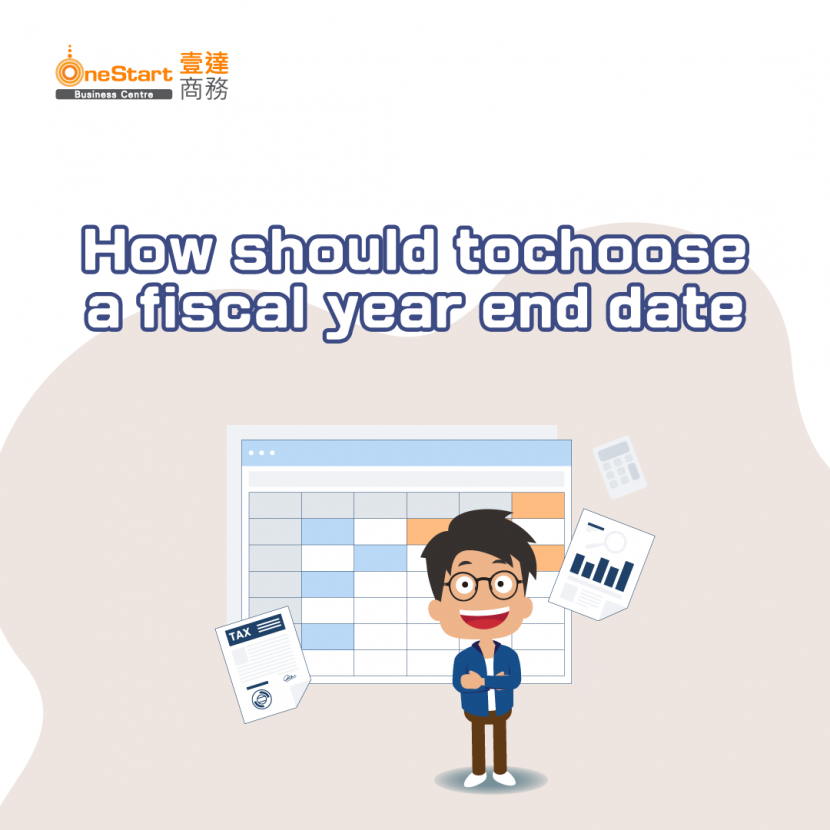Related Article:
3 Key Tips to Help through Audits Effortlessly in Hong Kong
Profits Tax in Hong Kong Explained, 3 Tips for Easy Tax Return
Table of contents |
Choosing the right fiscal year-end date is a significant decision that affects not only a company's accounting practices but also its tax reporting and financial planning. This article delves into how companies in Hong Kong can select the most suitable fiscal year-end date based on their unique circumstances, as well as the potential implications of this choice.
1. What is a Fiscal Year-End Date?
A fiscal year-end date marks the last day of a company's fiscal year, signifying the end of a complete accounting cycle. It is a critical date for preparing annual financial statements and for tax reporting purposes. Companies in Hong Kong have the flexibility to choose their fiscal year start and end dates, typically opting for a 12-month period.
Hong Kong's Tax Year
Hong Kong companies are required to submit profits tax returns within a specified period after the fiscal year-end. The choice of year-end date impacts the timeline for tax reporting. The Hong Kong Inland Revenue Department's tax year runs from April 1st to March 31st of the following year. Consequently, many Hong Kong companies align their fiscal year with the government's financial year, choosing March 31st as their fiscal year-end.
The Importance of the Fiscal Year-End Date
Financial Statements: The fiscal year-end determines the timing for the preparation of annual financial statements, including the balance sheet, income statement, and cash flow statement. These reports provide crucial financial information to the company's management, investors, and other stakeholders.
Here are the tax filing deadlines for different fiscal year-end dates:
- December 1st to December 31st (Accounting Date Code D):Tax filing deadline is August 15th of the following year.
- January 1st to March 31st (Accounting Date Code M):Tax filing deadline is August 15th of the following year.
- April 1st to November 30th (Accounting Date Code N): Tax filing deadline is May 2nd of the following year.

2. Factors to Consider When Choosing a Fiscal Year-End Date
Business Cycle and Seasonality:
Different industries have specific business cycles and seasonal fluctuations. Choosing a fiscal year-end date that aligns with the company's peak or low business periods can more accurately reflect its financial position and operating performance. For example, many retailers choose January 31st as their fiscal year-end, as this often follows a post-holiday low season.
Business Planning:
The fiscal year-end can be synchronized with the company's business cycle, helping to present a more accurate and truthful reflection of its financial health and performance. Certain industries may have traditional fiscal year-end dates, making it easier for comparative analysis and benchmarking.
Group Company Coordination:
For companies that are part of a larger group, aligning the fiscal year-end with that of the parent company or other group members can simplify internal financial reporting processes and facilitate overall strategic planning and performance assessment.
Tax Planning and Incentive Policies:
Although Hong Kong's tax year is fixed, selecting an appropriate fiscal year-end can still impact a company's tax planning. Some tax incentives may be tied to specific periods, and choosing the right fiscal year-end can maximize these benefits.
Other Considerations:
Audit and Financial Reporting Preparation Time:Avoiding the busiest periods for the company or auditors (typically from December to March) can enhance audit quality and efficiency while reducing costs.
Deferring Tax PaymentsAvoiding the busiest periods for the company or auditors (typically from December to March) can enhance audit quality and efficiency while reducing costs.
Avoiding Overlaps with Public Holidays: The fiscal year-end should ideally not coincide with major public holidays, particularly Lunar New Year and Christmas.

3. Can the Fiscal Year-End Date be Changed?
Companies can change their fiscal year-end date as needed, but they must submit an application to the Companies Registry and disclose the reasons and effects of the change in their financial statements. Before deciding to change the fiscal year-end date, it is advisable for companies to consult with professional accountants or tax advisors to ensure the decision is reasonable and compliant.
How to Change the Fiscal Year-End Date?
If a company decides to change its fiscal year-end date, the following steps must be followed:
Board Resolution: The company must first pass a board resolution formally approving the decision to change the fiscal year-end date. The board meeting minutes should detail this resolution, including the new fiscal year-end date and the reasons for the change.
Notify the Companies Registry: According to the Hong Kong Companies Ordinance, the company must submit a written notice to the Hong Kong Companies Registry following the decision to change the fiscal year-end date. The notice should include the company's name and registration number, the original and new fiscal year-end dates, and the reasons for the change.
Notify the Inland Revenue Department:The company must inform the Hong Kong Inland Revenue Department of the decision to change the fiscal year-end date and submit transitional financial statements covering the period from the original to the new fiscal year-end date.
Update Internal Records: Ensure that all relevant internal records and documents are updated, including accounting systems, tax filing documents, and internal reports.
Disclosure in Financial Statements: When preparing the new financial statements, the company must disclose details of the fiscal year-end change in the notes, including the reasons for the change and its effects.

4. Conclusion
Choosing the appropriate fiscal year-end date is a crucial decision that Hong Kong companies must carefully consider. It affects not only financial reporting and tax filing but can also have a significant impact on business planning and resource allocation. Companies should select a fiscal year-end date that aligns with their business nature, industry characteristics, tax considerations, and future development plans.
Regardless of the selected fiscal year-end date, companies must ensure they have sufficient time and resources to complete annual closing, auditing, and tax filing activities. Additionally, they should consider the impact of this choice on all stakeholders. Companies should regularly assess the suitability of their chosen fiscal year-end date to ensure it continues to meet their needs and objectives. If the current fiscal year-end date is no longer appropriate, companies may consider making a change, but they should carefully evaluate the potential impacts and costs associated with the change.
OneStart Business Centre has years of experience and dedicated staff to assist enterprises in opening bank accounts. Please feel free to call or WhatsApp (852) 3575 6888 to our OneStart Business Consultant.
Click to WhatsApp OneStart:
Know More About Our Services:
 |
 |
 |













